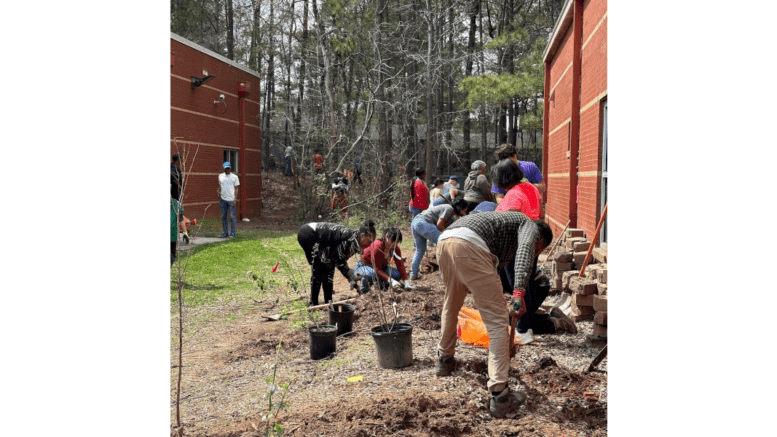Photo of planting a food forest provided by Barry Krebs
by John A. Tures, Professor of Political Science, LaGrange College
In my previous column, I documented how participation in service could help America overcome its declining Happiness Index rankings in the world. In this section, I continue my interview with a South Cobb service-oriented individual, who reveals the hidden benefits of how service can provide a better “vision” for America.
When the USA dropped from 15th to 23rd, speculation was rampant about what could be the cause. Our U.S. Surgeon General, Dr. Vivek Murthy, blamed social media. After all, it’s different across the ages. For older people, the USA ranking is in the top 10. When it comes to our younger people, we’re ranked in the 60s worldwide.
That Guardian article, as well as other stories on the Happiness Index were long on problems and short on solutions, other than government regulation of social media. But as I noted in my previous article, we could energize our country overall, and younger people in particular, on promoting service, what President Kennedy called for when he said “Ask not what your country can do for you. Ask what you can do for your country.”
To find out more about service and how it matters, I continued my interview with Barry Krebs from the South Cobb Lions Club. My questions are in italics, before his responses in quotes.
What’s a particularly great story you have about a service moment that just sort of says it all for why service matters? “The story that I like to tell is about how a timid person approached me about having his eyes checked. I took him through the process of getting approved for mostly free services and it turns out that he was 90% blind in both eyes due to cataracts. This person did not have health insurance. While getting his eyes corrected, we found out that his blood pressure was extremely high as well as him having diabetes. He was unaware of both conditions. Now he sees 20/20 in his right eye and he is on medication to control his blood pressure. He has also changed his sugar intake for the diabetes issue. He is also much less dangerous behind the wheel of his vehicle.”
Krebs added “Last year, we conducted vision screenings on over 15,000 elementary school students using SPOT machines that are designed to quickly detect eye problems. If we catch a problem with a younger student, in many cases, the problem can be corrected before it becomes permanent. As we are doing our screenings, we sometimes run across students with very serious eye issues. We hope that catching these problems early will give this child a better chance at learning and happiness in the future.”
In fact, that’s how I became familiar with the Lions Club. A chance accident where one of my kids broke my glasses led me to get my vision checked for a new pair and found that my eyesight had improved. Not needing my backup pair of glasses, I donated them to the LaGrange Lions Club; the Lions Club International provides a lot of leadership in rehabilitating one’s eyesight.
What do you observe as the biggest rewards for service? “I am recently retired. One of the benefits that I get from the Lions Club is to learn how to age gracefully. I have really enjoyed getting to meet my neighbors and community while I still have lots of energy. I know that one day, I will have to start slowing down. I carefully watch our senior Lions leaders as they move towards coaching more than doing. I listen very carefully to their advice and learn new things daily. In addition to learning from others, my favorite reward is looking back on a job well done where we have truly helped someone.”
He went on to write “Probably the greatest honor that our South Cobb Lions Club achieved was in 2016 when we were flown to Washington DC to accept the Keep America Beautiful Civic Improvement Award for our litter cleanup efforts.”
This recognition, and other public acknowledgment of community service, could be the first step toward regaining national happiness, for all Americans, especially our younger people.
John A. Tures is a professor of political science at LaGrange College in LaGrange, Georgia. His views are his own. He can be reached at jtures@lagrange.edu. His Twitter account is JohnTures2.
